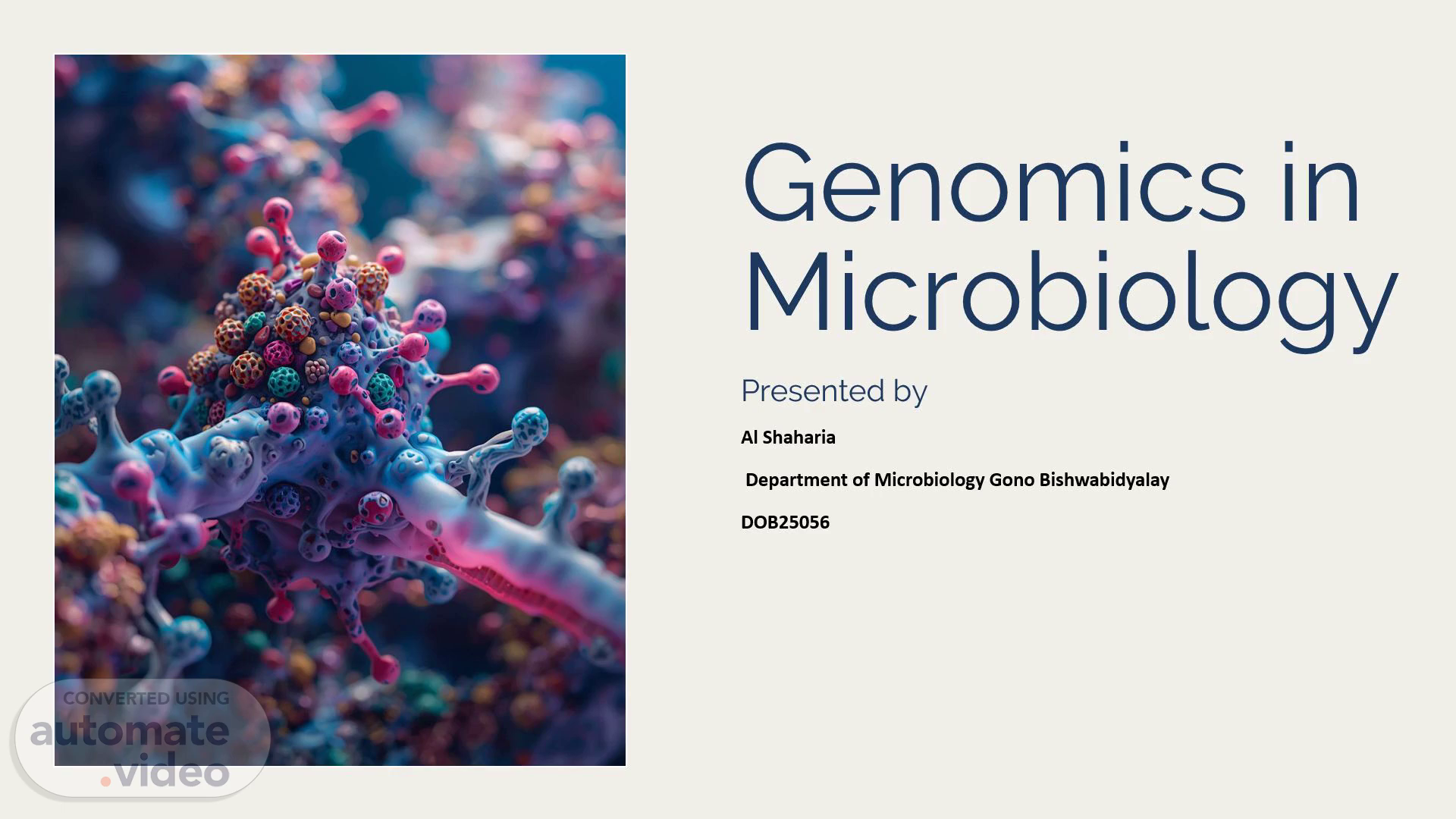Scene 1 (0s)
Genomics in Microbiology Presented by Al Shaharia Department of Microbiology Gono Bishwabidyalay DOB25056.
Scene 2 (6s)
[Audio] The application of genomics to microbiology has led to significant advancements in the diagnosis and treatment of infectious diseases. The use of next-generation sequencing (NGS) technology has enabled researchers to quickly and accurately analyze the genetic material of microorganisms, allowing for rapid identification of pathogens and development of targeted treatments. Additionally, the analysis of genomic data has revealed new insights into the evolution and transmission of infectious diseases, enabling better management of outbreaks and more effective control measures. Furthermore, the integration of genomics with other disciplines such as epidemiology and public health has facilitated the development of novel diagnostic tools and vaccines. The ability to sequence entire genomes has also opened up new opportunities for the discovery of antimicrobial resistance genes, which are critical for the development of effective antibiotic therapies..
Scene 3 (1m 9s)
[Audio] The genomic analysis of microorganisms has become increasingly sophisticated over time. This advancement has led to significant improvements in our understanding of microbial genetics and evolution. The ability to sequence large portions of microbial genomes has enabled researchers to identify specific genes responsible for various traits and behaviors. By studying these genes, scientists can gain insights into the mechanisms underlying microbial physiology and pathogenesis. Furthermore, advances in genomics have facilitated the development of new diagnostic tools and treatments for infectious diseases..
Scene 4 (1m 50s)
[Audio] Genomic analysis of clinical samples allows healthcare professionals to identify pathogens directly, which is essential for diagnosing diseases like COVID-19, tuberculosis, and other viral infections. This technique enables doctors to make accurate diagnoses quickly, facilitating timely treatment and intervention. The use of genomic techniques also helps detect antibiotic resistance in bacteria, which is identified through specific genes that confer resistance to antibiotics. Selecting the right antibiotic based on this information reduces the risk of misuse and improves infection control strategies. Whole-genome sequencing provides valuable insights into the spread of outbreaks by comparing bacterial strains. This data is critical in hospital infection control, food safety investigations, and national disease surveillance. Analyzing the genetic makeup of bacteria helps scientists understand outbreak dynamics and develop targeted interventions to prevent future occurrences..
Scene 5 (2m 56s)
[Audio] Genomics provides numerous benefits in the field of microbiology, including enhanced understanding of microbial diversity and improved disease diagnosis and treatment. With genomics, researchers can uncover previously unknown microbial species in various environments, expanding our knowledge of the microbial world. Furthermore, genomic tools enable rapid identification and analysis of pathogens, facilitating quicker and more accurate disease diagnosis and treatment. This advancement has significant implications for public health, allowing for more effective management of infectious diseases and prevention of outbreaks. Additionally, genomics plays a crucial role in developing novel antimicrobial therapies and vaccines, further enhancing our capacity to combat microbial threats. By harnessing the power of genomics, scientists can gain a deeper understanding of the complex relationships between microbes and their hosts, ultimately leading to innovative solutions for addressing global health challenges..
Scene 6 (4m 3s)
[Audio] The genomics of microorganisms has revolutionized the way we understand their behavior and interactions. This new understanding has enabled us to better comprehend the complex relationships between microbes and their environment. The ability to analyze genetic material has provided a wealth of information about the evolution, development, and function of these organisms. Moreover, advances in sequencing technologies have made it possible to study the genomes of entire species, allowing us to gain a deeper insight into the diversity of life on Earth. The impact of genomics on medicine has been significant, enabling doctors to make more accurate diagnoses and developing new treatments. Additionally, genomics has helped scientists to identify the causes of diseases and develop strategies to combat them. The future of genomics holds much promise, with ongoing research focusing on the development of new diagnostic tools and the creation of personalized medicine. As technology continues to advance, genomics will play an increasingly important role in improving human health and well-being..
